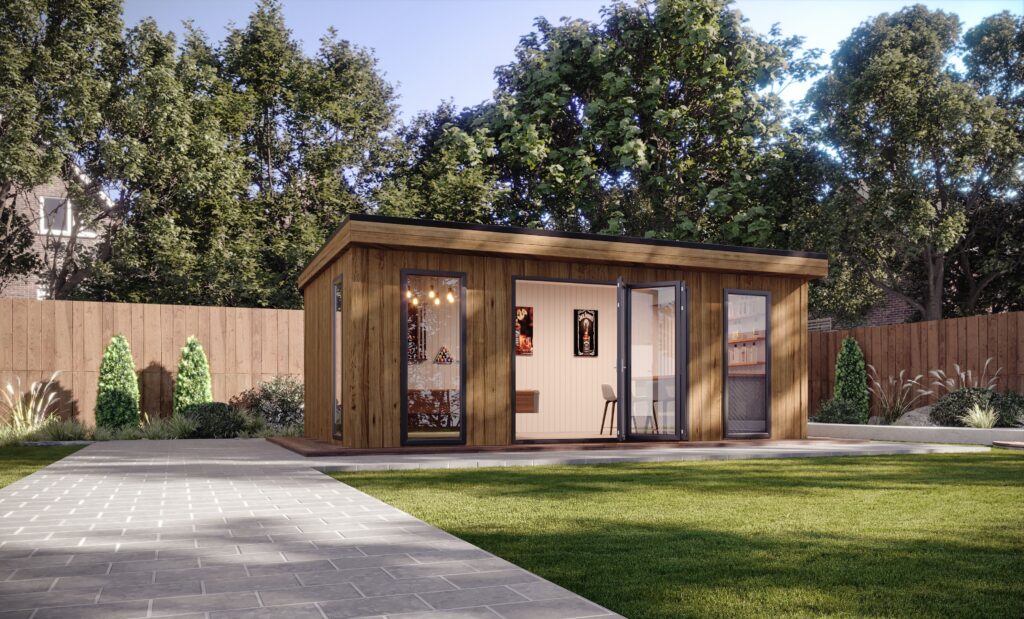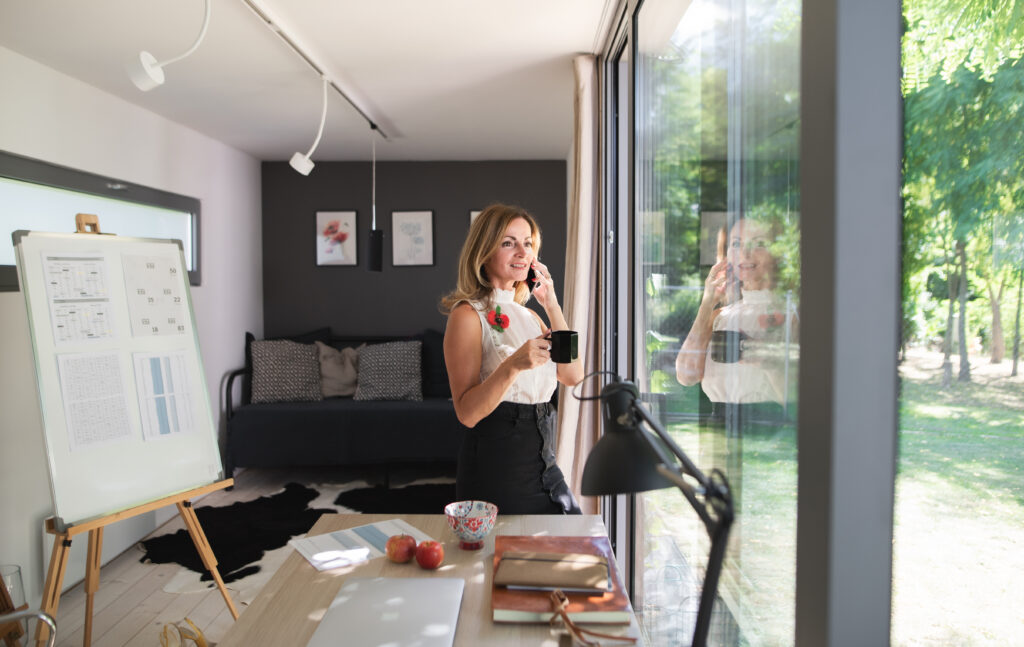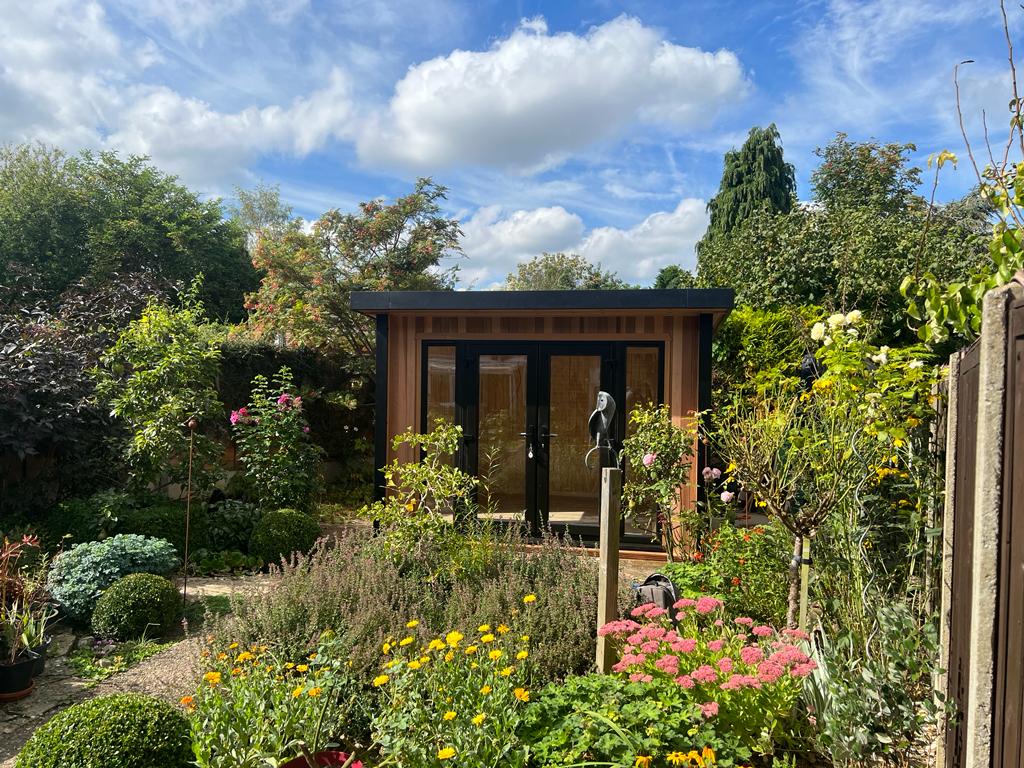Home Office Extension or Garden Office – Which Is the Best Option for Remote Work?
When setting up a home office, many face two primary options: extending their home to create additional office space or installing a self-contained garden room office. Each option offers distinct benefits depending on personal needs and space availability. But which is right for you?
Weighing the Pros and Cons of Home and Garden Offices

As remote working continues to grow globally, more than 44% of UK workers are now working either fully remotely or in a hybrid model. This shift has led to an increased need for dedicated workspaces at home, where distractions are minimised, and productivity can thrive.
There is no one right way to go about this – various WFH spaces work for different reasons and for different people, so we have put together this guide to help you identify what will suit you best.
Home Office – The Traditional Choice

Setting up a home office within your existing living space is often the first option people consider. It involves converting an existing room or space into a work area or extending the house to create a dedicated office. While it’s a convenient solution, it comes with its own set of advantages and drawbacks.
Pros of a Home Office
- Convenience: The biggest advantage of a home office is its proximity. It is fully integrated into your home, which makes the transition between work and home life as seamless as possible.
- Cost Efficiency (Short-Term): For those who already have unused space or a spare room, converting it into an office can be relatively affordable. Repurposing existing rooms involves minimal renovation costs – and you may only need to invest in office furniture and some tech upgrades.
- Adds Home Value: Building an extension or converting loft space into an office adds square footage to your home, potentially increasing its overall market value. This makes it a strategic investment, particularly for those planning to sell in the future.
Cons of a Home Office
- Distractions: While having an office inside the home is convenient, it can blur the lines between personal and professional life. Noise from family members, household chores, or pets can create a disruptive environment that makes it difficult to maintain focus.
- Limited Space: Not every home has the luxury of a spare room to convert. Many people find themselves trying to carve out a corner in the living room, dining area, or even a bedroom. This can lead to cramped working conditions that may not be ideal for long-term use, affecting both comfort and productivity.
- Cost (Long-Term): While a home office conversion can be cheaper initially, a more complex extension comes with significant long-term costs. Construction projects are often disruptive, requiring planning permission, design fees, and potentially extensive labour costs. Plus, the need for insulation, electrical wiring, and other utilities can drive up the price even further.
While a home office is a traditional and often convenient option, it is not without its limitations. For some, the benefits of being close to home outweigh the downsides of distractions and space limitations. However, the long-term costs and potential disruptions should also be considered when making a decision.
Garden Office – A Self-Contained Solution

A garden office offers an alternative to the traditional home office, providing a dedicated, purpose-built workspace separate from the main house. As remote work becomes more common, this option has gained popularity for its versatility and efficiency. Here’s a breakdown of its benefits and drawbacks:
Pros
- Separation of Work and Home: One of the most appealing aspects of a garden office is the physical distance it creates between your home life and work life. This separation helps establish clear boundaries, allowing for better focus during the workday and making it easier to switch off after hours. The short walk to your garden office helps signal the start of the working day, while locking up at the end can create a clear mental transition back to home mode.
- Flexibility: Garden offices are highly customisable, allowing you to design a space that fits your specific needs. Whether you require extra insulation, specific dimensions, or certain aesthetic features, a garden office can be tailored to suit your requirements. It can also serve multiple purposes, such as a fitness studio, hobby room, or even a space for client meetings.
- Quicker and Less Disruptive: Unlike home extensions, which can be noisy, time-consuming, and invasive, garden offices are generally quicker to install. Prefabricated garden offices, like those offered in our range, can be delivered and set up in as little as a day. This reduces the disruption to your daily routine and avoids the chaos that can come with home renovations.
- Year-Round Use: Modern garden offices are designed for year-round use, with high-quality insulation in walls, floors, and ceilings. As an example, we ensure that our garden offices meet the latest insulation standards, maintaining comfortable temperatures in both summer and winter.
- Planning Permission: In many cases, garden offices fall under permitted development, meaning they do not require formal planning permission. As long as the building stays within certain height and size limitations, you can bypass the lengthy planning process, saving both time and money.
Cons
- Garden Space: One of the primary drawbacks of a garden office is that it requires outdoor space. If you have a smaller garden, a garden office could take up a significant portion of your outdoor area. For this reason, we do offer bespoke micro office pods, designed to fit where they are needed.
- Upfront Cost: While a garden office is generally cheaper than a full home extension, it still requires a significant upfront investment. High-quality garden offices with proper insulation, electrical wiring, and durable materials can range in cost, depending on size and customisation. Most of our garden offices fall between £8,000 and £15,000 – whereas home extensions start at £20,000 and can exceed £75,000.
- Utility Connections: Setting up a garden office requires connecting utilities like electricity, and in many cases, internet access. Our garden offices feature pre-installed, concealed wiring for quick setup and a professional look, and we provide all electrical components, including flush-mounted outlets and lights. Final connections may require a certified electrician.
A garden office provides a quiet, customisable, and efficient workspace that can significantly improve your work-from-home experience. Despite the upfront cost and space considerations, it offers a range of benefits that make it a strong alternative to a home office, especially for those looking to create a clear separation between work and personal life.
Which Option Is Right for You?

Both the home office and garden office offer valuable benefits, but which one is right for you depends on your unique situation. If you’re seeking a quick, non-disruptive solution that allows for greater focus and work-life balance, a garden office is an ideal choice.
Finding Your Perfect Workspace

Ultimately, consider your budget, how much space you have, and how quickly you need the solution. Both options can create an effective workspace, but a garden office may be the better long-term investment for remote work.
Feel free to try our online visual builder, so you can see exactly what’s possible and how much it could cost you.
